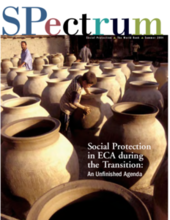The economic and social shocks of transition from a socialist economy to a free market economy have had an adverse impact on the capacity of many families in the Europe and Central Asia (ECA) region to manage risks, and on the capacity of the State to provide meaningful support. As a result, the well-being of children across the region, and in particular in former Soviet countries, has deteriorated. Children face an increased risk of being poor and extremely poor, particularly if they live in multichildren or single-parent families. Their health and nutrition status has worsened. Access to education, and in particular to quality education, has deteriorated as well. Children are more likely to be deprived of birth family upbringing and to be placed in an institution; to be neglected, homeless, or abused; to become an alcoholic; and to commit a crime. These developments challenge not only the immediate welfare of poor and vulnerable children in ECA, but also their longer-term prospects, because by falling behind in human capital development, they may not be able to grow out of poverty. Beyond the adverse implications for the individual, however, the deteriorating health and educational status of a country’s population is likely to lead to increased social, financial, and economic costs, and to hinder the country’s participation in the labor market, and thus its economic performance.
Throughout the years of World Bank involvement in ECA, improving child welfare has been one of the pillars of the social protection dialogue with the client countries. The dialogue has focused on, among other things, the trends in child welfare, reforms of the institutional and regulatory framework for family and child welfare policies, development of child- and family-centered policies and institutions, strengthening implementation arrangements and capacity building, and improving resources management efficiency. Particular attention has been paid to the development of previously nonexistent preventive community based child and family welfare programs that would, in coordination with programs in health and education and cash programs in social assistance, provide a range and a continuum of care to poor and vulnerable families so as to strengthen their capacity to take care of their children.
The World Bank’s ECA Social Protection group has initiated a series of country-specific child welfare studies and Policy Notes, which serve as an analytical base for the policy dialogue and which provide a framework for the reform of child welfare policies and institutions, the first being for Romania in 1997. Two more recent studies were completed in 2003: the “Armenia Child Welfare Note,” and “Child Welfare Outcomes During the 1990s: The Case of Russia.” A study on “Child Welfare in Georgia” will be completed in 2004.
©UNICEF and The World Bank

